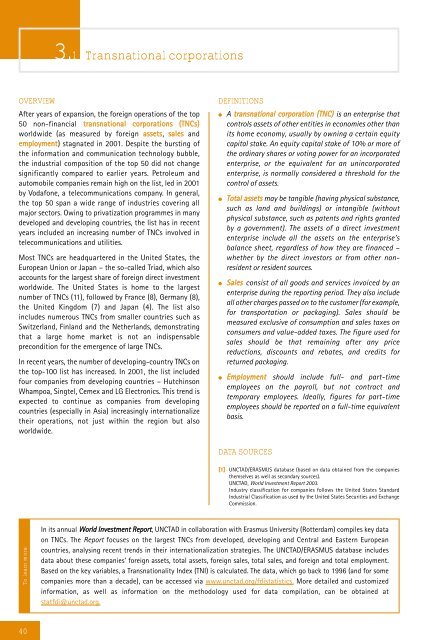Development and Globalization: - Unctad
Development and Globalization: - Unctad
Development and Globalization: - Unctad
Create successful ePaper yourself
Turn your PDF publications into a flip-book with our unique Google optimized e-Paper software.
OVERVIEW DEFINITIONS<br />
After years of expansion, the foreign operations of the top<br />
50 non-financial transnational corporations (TNCs)<br />
worldwide (as measured by foreign assets, sales <strong>and</strong><br />
employment) stagnated in 2001. Despite the bursting of<br />
the information <strong>and</strong> communication technology bubble,<br />
the industrial composition of the top 50 did not change<br />
significantly compared to earlier years. Petroleum <strong>and</strong><br />
automobile companies remain high on the list, led in 2001<br />
by Vodafone, a telecommunications company. In general,<br />
the top 50 span a wide range of industries covering all<br />
major sectors. Owing to privatization programmes in many<br />
developed <strong>and</strong> developing countries, the list has in recent<br />
years included an increasing number of TNCs involved in<br />
telecommunications <strong>and</strong> utilities.<br />
Most TNCs are headquartered in the United States, the<br />
European Union or Japan – the so-called Triad, which also<br />
accounts for the largest share of foreign direct investment<br />
worldwide. The United States is home to the largest<br />
number of TNCs (11), followed by France (8), Germany (8),<br />
the United Kingdom (7) <strong>and</strong> Japan (4). The list also<br />
includes numerous TNCs from smaller countries such as<br />
Switzerl<strong>and</strong>, Finl<strong>and</strong> <strong>and</strong> the Netherl<strong>and</strong>s, demonstrating<br />
that a large home market is not an indispensable<br />
precondition for the emergence of large TNCs.<br />
In recent years, the number of developing-country TNCs on<br />
the top-100 list has increased. In 2001, the list included<br />
four companies from developing countries – Hutchinson<br />
Whampoa, Singtel, Cemex <strong>and</strong> LG Electronics. This trend is<br />
expected to continue as companies from developing<br />
countries (especially in Asia) increasingly internationalize<br />
their operations, not just within the region but also<br />
worldwide.<br />
To learn more<br />
40<br />
3.1 Transnational corporations<br />
● A ttrraannssnnaattiioonnaall ccoorrppoorraattiioonn ((TTNNCC)) is an enterprise that<br />
controls assets of other entities in economies other than<br />
its home economy, usually by owning a certain equity<br />
capital stake. An equity capital stake of 10% or more of<br />
the ordinary shares or voting power for an incorporated<br />
enterprise, or the equivalent for an unincorporated<br />
enterprise, is normally considered a threshold for the<br />
control of assets.<br />
● TToottaall aasssseettss may be tangible (having physical substance,<br />
such as l<strong>and</strong> <strong>and</strong> buildings) or intangible (without<br />
physical substance, such as patents <strong>and</strong> rights granted<br />
by a government). The assets of a direct investment<br />
enterprise include all the assets on the enterprise’s<br />
balance sheet, regardless of how they are financed –<br />
whether by the direct investors or from other nonresident<br />
or resident sources.<br />
● SSaalleess consist of all goods <strong>and</strong> services invoiced by an<br />
enterprise during the reporting period. They also include<br />
all other charges passed on to the customer (for example,<br />
for transportation or packaging). Sales should be<br />
measured exclusive of consumption <strong>and</strong> sales taxes on<br />
consumers <strong>and</strong> value-added taxes. The figure used for<br />
sales should be that remaining after any price<br />
reductions, discounts <strong>and</strong> rebates, <strong>and</strong> credits for<br />
returned packaging.<br />
● EEmmppllooyymmeenntt should include full- <strong>and</strong> part-time<br />
employees on the payroll, but not contract <strong>and</strong><br />
temporary employees. Ideally, figures for part-time<br />
employees should be reported on a full-time equivalent<br />
basis.<br />
DATA SOURCES<br />
[1] UNCTAD/ERASMUS database (based on data obtained from the companies<br />
themselves as well as secondary sources).<br />
UNCTAD, World Investment Report 2003.<br />
Industry classification for companies follows the United States St<strong>and</strong>ard<br />
Industrial Classification as used by the United States Securities <strong>and</strong> Exchange<br />
Commission.<br />
In its annual WWoorrlldd IInnvveessttmmeenntt RReeppoorrtt, UNCTAD in collaboration with Erasmus University (Rotterdam) compiles key data<br />
on TNCs. The Report focuses on the largest TNCs from developed, developing <strong>and</strong> Central <strong>and</strong> Eastern European<br />
countries, analysing recent trends in their internationalization strategies. The UNCTAD/ERASMUS database includes<br />
data about these companies’ foreign assets, total assets, foreign sales, total sales, <strong>and</strong> foreign <strong>and</strong> total employment.<br />
Based on the key variables, a Transnationality Index (TNI) is calculated. The data, which go back to 1996 (<strong>and</strong> for some<br />
companies more than a decade), can be accessed via www.unctad.org/fdistatistics. More detailed <strong>and</strong> customized<br />
information, as well as information on the methodology used for data compilation, can be obtained at<br />
statfdi@unctad.org.

















